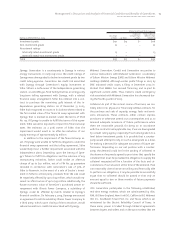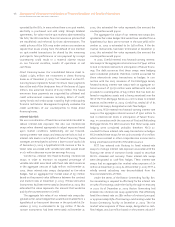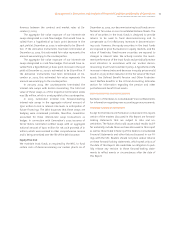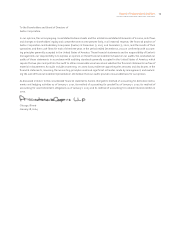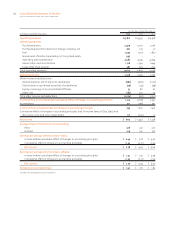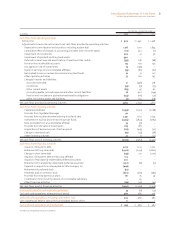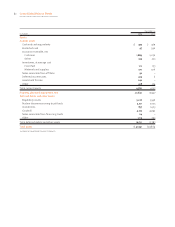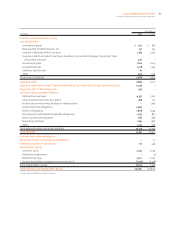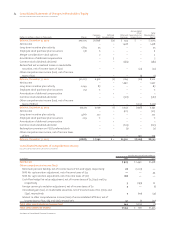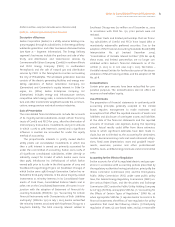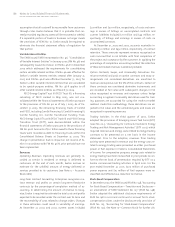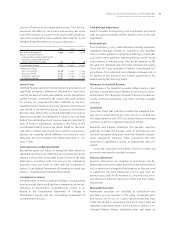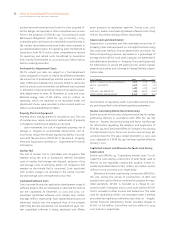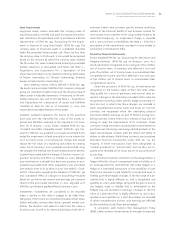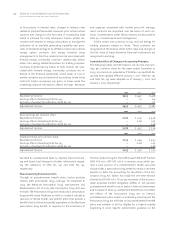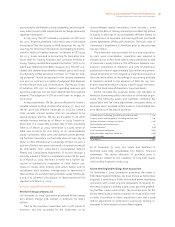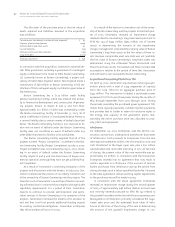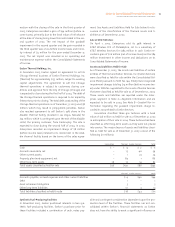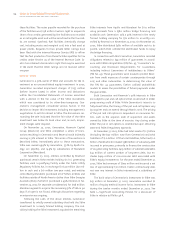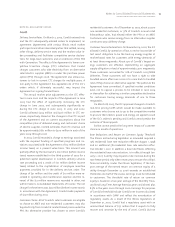ComEd 2003 Annual Report Download - page 87
Download and view the complete annual report
Please find page 87 of the 2003 ComEd annual report below. You can navigate through the pages in the report by either clicking on the pages listed below, or by using the keyword search tool below to find specific information within the annual report.85Notes to Consolidated Financial Statements
EXELON CORPORATION AND SUBSIDIARY COMPANIES
(Dollars in millions, except per share data unless otherwise noted)
NOTE 01 ‰SIGNIFICANT ACCOUNTING POLICIES
Description of Business
Exelon Corporation (Exelon) is a utility services holding com-
pany engaged, through its subsidiaries, in the energy delivery,
wholesale generation and other businesses discussed below
(see Note 21 – Segment Information). The Energy Delivery
segment’s businesses include the purchase and sale of elec-
tricity and distribution and transmission services by
Commonwealth Edison Company (ComEd) in northern Illinois
and PECO Energy Company (PECO) in southeastern
Pennsylvania and the sale of natural gas and distribution
services by PECO in the Pennsylvania counties surrounding
the City of Philadelphia. The wholesale generation business
consists of the electric generating facilities and energy mar-
keting operations of Exelon Generation Company, LLC
(Generation) and Generation’s equity interest in Sithe En-
ergies, Inc. (Sithe). Exelon Enterprises Company, LLC
(Enterprises) includes energy and infrastructure services,
competitive retail energy sales, a communications joint ven-
ture and other investments weighted towards the communi-
cations, energy services and retail services industries.
Basis of Presentation
The consolidated financial statements include the accounts
of its majority-owned subsidiaries, except certain financing
trusts of ComEd and PECO for 2003, after the elimination of
intercompany transactions. Investments and joint ventures
in which a 20% to 50% interest is owned and a significant
influence is exerted are accounted for under the equity
method of accounting.
The proportionate interests in jointly owned electric
utility plants are consolidated. Investments in which less
than a 20% interest is owned are primarily accounted for
under the cost method of accounting. Exelon owns 100% of
all significant consolidated subsidiaries, either directly or
indirectly, except for ComEd of which Exelon owns more
than 99%, InfraSource Inc. (InfraSource) of which Exelon
owned 95% prior to its sale in the third quarter of 2003 and
Southeast Chicago Energy Project, LLC (Southeast Chicago) of
which Exelon owns 74% through Generation. Exelon has re-
flected the third-party interests in the above majority-owned
investments as minority interests in its Consolidated State-
ments of Cash Flows, Consolidated Balance Sheets and in
other, net on the Consolidated Statements of Income. In con-
junction with the adoption of Statement of Financial Ac-
counting Standards (SFAS) No. 150, “Accounting for Certain
Financial Instruments with Characteristics of Both Liabilities
and Equity” (SFAS No. 150) on July 1, 2003, Exelon reclassified
the minority interest associated with Southeast Chicago to a
long-term liability. The total minority interest related to
Southeast Chicago was $51 million as of December 31, 2003.
In accordance with SFAS No. 150, prior periods were not
restated.
Certain trusts and limited partnerships that are financ-
ing subsidiaries of ComEd and PECO have issued debt or
mandatorily redeemable preferred securities. Due to the
adoption of the Financial Accounting Standards Board (FASB)
Interpretation No. 46 (revised December 2003),
“Consolidation of Variable Interest Entities” (FIN No. 46-R),
these trusts and limited partnerships are no longer con-
solidated within Exelon’s financial statements as of De-
cember 31, 2003 or, in one case, July 1, 2003. See below –
Variable Interest Entities for further discussion of the decon-
solidation of these financing entities and the adoption of FIN
No. 46-R.
Reclassifications
Certain prior year amounts have been reclassified for com-
parative purposes. The reclassifications did not affect net
income or shareholders’ equity.
Use of Estimates
The preparation of financial statements in conformity with
accounting principles generally accepted in the United
States requires management to make estimates and
assumptions that affect the reported amounts of assets and
liabilities and disclosure of contingent assets and liabilities
at the date of the financial statements and the reported
amounts of revenues and expenses during the reporting
period. Actual results could differ from those estimates.
Areas in which significant estimates have been made in-
clude, but are not limited to, the accounting for derivatives,
nuclear decommissioning costs and asset retirement obliga-
tions, fixed asset depreciation, asset and goodwill impair-
ments, severance, pension and other postretirement
benefits, taxes, unbilled energy revenues and environmental
costs.
Accounting for the Effects of Regulation
Exelon accounts for all of its regulated electric and gas oper-
ations in accordance with accounting policies prescribed by
the regulatory authorities having jurisdiction, principally the
Illinois Commerce Commission (ICC) and the Pennsylvania
Public Utility Commission (PUC) under state public utility
laws, the Federal Energy Regulatory Commission (FERC) un-
der various Federal laws, and the Securities and Exchange
Commission (SEC) under the Public Utility Holding Company
Act of 1935 (PUHCA), and applies SFAS No. 71, “Accounting for
the Effects of Certain Types of Regulation,” (SFAS No. 71)
when appropriate. SFAS No. 71 requires Exelon to record in its
financial statements the effects of rate regulation for utility
operations that meet the following criteria: (1) third-party
regulation of rates; (2) cost-based rates; and (3) a reasonable


